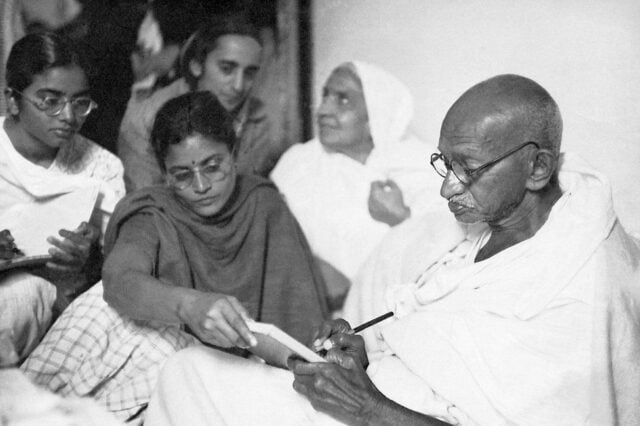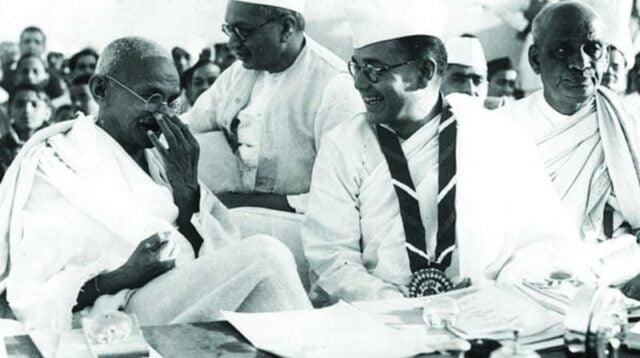As Mahatma Gandhi’s birth anniversary passes the 152nd year, the question of his contribution to the national cause has been brought to the forefront yet again. The man who spearheaded the many civil disobedience movements in India alongside his fabled movement on South African soil, has been deemed as one of the most controversial figures of the independence movement.
Furthermore, it has been the question of many a person belonging to the Indian intelligentsia as to how deserving is Gandhi of the ‘Father of the Nation’ title. With a plethora of controversies rising against the iconic personality with each passing day, his presence as a hero is deemed more contentious with each passing day.
Thus, it is only fair to ask ourselves the one question- Is he really deserving of being called the ‘Father of the Nation’?
Mahatma’s Ego Could Have Cost Us Our Independence
Let us go back in time to enunciate the course of Gandhi’s life. In his memoir/autobiography, he illustrated how a person’s ego is the bane of all existence.
Furthermore, it is the very same ego that had made him indulge in deplorable acts which were abusive, manipulative or, sometimes, both. Fair to state that it is the victors who form their brand of history and Gandhi won his piece of the pie, with solemn ease.
It is through a course of vanity, did he pose himself as a God-man, a holier than thou figurine. Unfortunately, in India, vanity sells and vanity complemented with confidence is the sure-shot way to success.

If one needs to gain insight into the narcissistic tendencies of the man, they wouldn’t have to look farther than the many quotes wherein he refers to his being as divine. It is through the same garb of narcissistic glory that he made the call for the many depraved and the suppressed to follow him towards the road of emancipation.
The focal argument concerning this statement is the fact that his vanity did bring about the convocation of the maligned and the downtrodden. However, it wouldn’t be the first time that a self-proclaimed ‘divine’ being guided a flock of the worn and trampled closer towards the light. Mother Teresa was one such person; if you know you know.
It must be noted, however, that although vain, his doctrines were mostly limited to him referring to his own self as an instrument of God, a prophet of sorts. Thus, it is through this innate need to fuel his ego that the Indian National Congress found itself at division’s gate.
The famed debacle between Netaji Subhash Chandra Bose and Mahatma Gandhi concerning the Presidency of the 1939 Congress session. The conflict was born from ideological differences between Subhash Chandra Bose’s left-leaning ideology and Gandhi’s right-leaning ideologue.
Also Read: Gandhi Jayanti 2021: There’s More Interesting Stuff To Gandhi You Don’t Know Than To The One You Know
1939 Congress Meeting: A Subtle Taste Of Gandhi’s Ego
The socialistic tendencies of Bose left a bad taste in Gandhi’s taste buds as he backed Pattabhi Sitaramayya to face him head on. However, as the entire tale goes, Sitaramayya ceded a defeat of the grandest scale as Netaji secured 1580 votes as opposed to Sitaramayya’s 1377.
This defeat led Gandhi to go on record to state that it was not Sitaramayya’s loss but his. His display of fantastic vanity did not end there but it proceeded with the Congress’ Working Committee resigning alongside Gandhi as he lobbied with them extensively. At the end of the day, this led to the infamous Pant Resolution.
Bose, with nerve-racking fever, joined the meeting where his disappointment knew no bounds. Govind Ballabh Pant’s resolution affirmed Congress’ belief in Gandhi’s fundamental policies. Moreover, it also stated that the President had to ‘nominate the Working Committee in accordance with the wishes of Gandhi’.
Unfortunately, Netaji failed to garner the support of the leftist wing of Congress as the Congress Socialist Party members abstained from voting while other leftist groups suggested amendments, however, they failed to follow through with them.
The Pant Resolution was passed, and, to the dismay of Bose, a single person’s vanity conquered all. Rajagopalachari, who had drafted the Pant Resolution, had infamously stated;
“There are two boats . . . One is an old boat . . . piloted by Mahatma Gandhi. Another man has a new boat . . . Mahatma Gandhi is a tried boatman who can safely transport you. If you go into the other boat, which I know is leaky, all will go down, and the river Narmada is indeed deep.”

Thus, to state that Gandhi was the one true nationalist and the make or break person for India’s independence is a stretch of the highest order. It must also be agreed upon that his contribution to the national effort is undeniable, however, his self-importance has led to detriment along the lengths of the country.
Yet, the intelligentsia barely wishes to speak about it which, unceremoniously, leaves deserving freedom fighters such as Bhagat Singh, Mangal Pandey, Khudiram Bose, Benoy, Badal and Dinesh, staying in comparative obscurity. The celebration is, at the end of the day, limited to Bapu; the ‘Father’ of our Nation.
As Netaji’s grandnephew, Chandra Kumar Bose, had once stated in an interview, “No nation in the world had attained freedom by begging for it or via negotiations.” Unfortunately, our history books have deemed it right to feed us with a faux fact of the country attaining independence solely through ‘negotiation.’
The many other freedom fighters who laid down their lives for the country, unfortunately, lost to the blank spaces between the pages of our history books.
Image Sources: Google Images
Sources: The Print, Times of India, Blogger’s own opinion
Connect with the blogger: @kushan257
This post is tagged under: Gandhi, Mahatma, Mahatma Gandhi, MK Gandhi, Gandhian thoughts, Lesser-known facts, India, Indian freedom struggle, 2 October, 1869, October 2, Gandhi Jayanti, Shastri Jayanti, Gandhi, International day of non-violence, Swachha Bharat, non-violence, Satyagraha, Quit-Indian Movement, Mahatma Gandhi Birthday, About Gandhi, netaji, congress, jawaharlal nehru





























